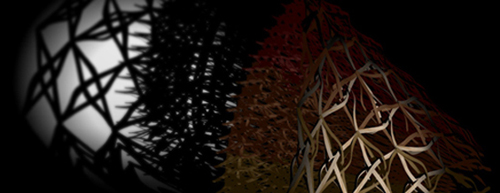Call for Papers
Transmaterial Aesthetics: Experiments with Timber in Architecture and Technology
International Symposium at ANCB The Aedes Metropolitan Laboratory
1 - 2 October 2013
In order to explore the interplay between aesthetics and technology in timber architecture, HS Wismar and UTS Sydney seek submissions that probe the topic of transmateriality from perspectives that redress imbalances and missing links in the debate. Critical investigations of historic or theoretical content, as well as practice-oriented contributions and case studies exploring the latest technological research in timber are welcome. Proposals for workshops are also invited.

Dates: Tuesday 1st October - Wednesday 2nd October 2013
Venue: ANCB The Metropolitan Laboratory, Christinenstr. 18-19 (Pfefferberg), 10119 Berlin
Background:
In the light of increasing environmental awareness, timber emerged at the forefront of material investigations in architecture over the past decades. Waste material from the end of the manufacturing process, or recycled material is fused with other materials to produce composites with changed structural, performative and aesthetic properties. Pulped, cast, bundled, 3D-printed, and robotically-stacked, new technologies enabled a radical shift away from traditional tectonics and towards articulations previously associated with other materials such as concrete, masonry and plastics. Together, these experiments give rise to a new techno-aesthetic paradigm that could be described as a form of transmateriality.
In nineteenth century architectural theory, Gottfried Semper’s Practical Aesthetics already suggested a synthesis between artistic and technological developments brought about by processes of material transfiguration (Stoffwechsel). Today, new visual languages emerge alongside innovative technologies that permit the realistic study of material changes across structures: in folded plates, grid-shells and multi-reciprocal frames, structural integrity is achieved through grading, layering and fusing of surfaces. In practice, developments in timber range from Walter Gropius’s and Konrad Wachsmann’s Packaged House, which unsuccessfully attempted to sell the modern dream of technologically advanced living to the masses, to Jürgen Mayer H’s Metropol Parasol whose captivating elastic forms promise the activation of public space.
Please send a 500-word abstract and a short cv to the symposium convenors Sandra Karina Löschke, UTS Sydney [email protected] and Matthias Ludwig, HS Wismar [email protected] by 3 June 2013. Abstracts will be double-blind refereed and notifications will be sent out by 17 June, 2013. If accepted, they will be published on the institutional websites.
The symposium is supported by ARUP and the UTS Centre for Contemporary Design Practices.

